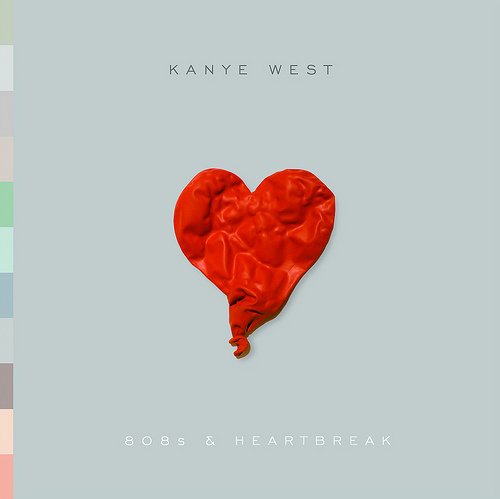Heartbreak is a new emotion for Kanye West. The multi-platinum rapper/producer makes headlines for skirmishes with photographers and awards-show tantrums, but between the death of his mother, Donda West, last November, and his split earlier this year with Alexis Phifer, his girlfriend of six years and fiancée of 18 months, it’s been a pretty rough year for arguably the biggest pop star in the world. These two personal losses, plus his various overblown controversies, have somewhat dampened the triumph of last year’s massive Graduation album and critically acclaimed Glow in the Dark Tour.
But even West’s many detractors have never questioned his work ethic and high personal standards, so it’s not necessarily surprising that he found time to record another album even in such a tumultuous year. What is shocking is the result, which might be the weirdest album released this century by a star of his stature. West eschews rapping entirely on 808s & Heartbreak, opting instead for an AutoTune-drenched croon. Gone is the stadium-sized swagger of his first three albums, replaced by the electro minimalism of “Say You Will” and the demented vaudeville shuffle of “Amazing.” ‘Ye still shows flashes of his normal hubris throughout, but when filtered through his newfound introspection it takes on a bitter, almost ironic tone.
808s isn’t out-there enough to be mainstream hip-hop’s Kid A, and even though it’s clearly a breakup album, it isn’t quite Kanye’s Blood on the Tracks. A better, if more unlikely, counterpart is the Smashing Pumpkins’ Adore. Like Billy Corgan’s 1998 opus, which was written following the death of Corgan’s mother and the firing of Pumpkins drummer Jimmy Chamberlain, 808s & Heartbreak is a minor masterpiece whose pleasures come from the little details rather than from overt hooks. There are bits of the album (“Heartless” in particular) that recall his earlier work, but very little of this material is what anyone would describe as “radio-friendly,” or even hip-hop.
808s gives the impression that we are listening to ‘Ye come to terms with his losses in real time. In the first act, he’s trying to make sense out of his life over the ominous, sweeping piano of “Welcome to Heartbreak,” before playing the victim and wondering what he did to deserve any of this. Then our hero lashes out at his ex in the industrial-tinged “Robocop” and defends his honor in the Young Jeezy-assisted “Amazing” (Jeezy provides the only actual rapping on the entire album). Finally, in the moving “Street Lights” West admits that he too was at fault (“Streetlights glowing/remind me of moments passing…I know my destination/but I’m just not there”), before letting go entirely with the devastating kiss-off “See You in My Nightmares,” which is hindered only by a largely unnecessary Lil Wayne cameo (both of them are buried so deep in AutoTune that their verses are nearly indistinguishable). On the last and best track, “Coldest Winter,” Kanye pays his last respects to his mother over chilly synths and tribal drums: “Memories fade in the coldest winter/goodbye my friend, I will never love again.” It is arresting to hear a notorious egomaniac like West get this introspective, and his cold, detached vocals make the bleak subject matter all the more affecting.
It’s hard to contextualize a record like 808s & Heartbreak with the rest of West’s canon, as it essentially represents a clean break from his past. The lack of vocal hooks makes it hard to view his foray into singing as a pop move, and the lack of overt bangers will probably alienate some hip-hop purists. But the album is brilliant on its own terms, perfectly imperfect and believably scattered. It’s clearly an album Kanye needed to make to get his own thoughts in order, but in the process he has injected something close to maturity into his public persona.

